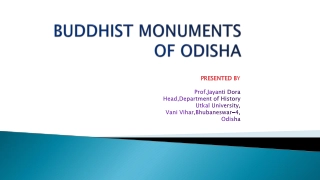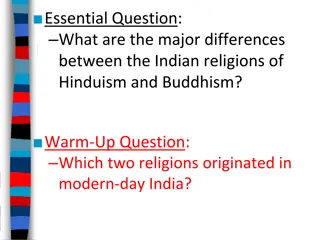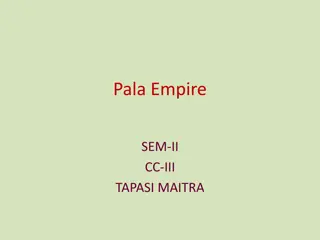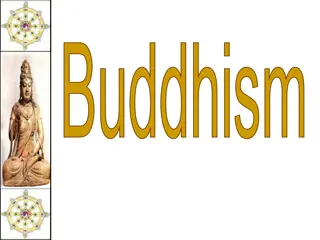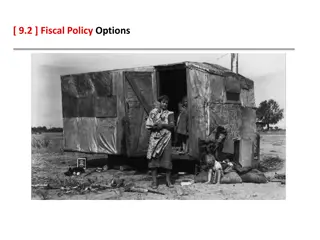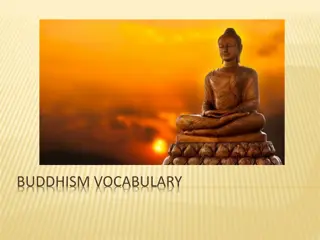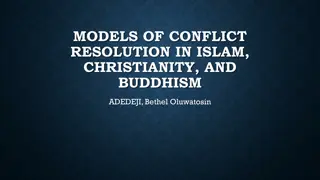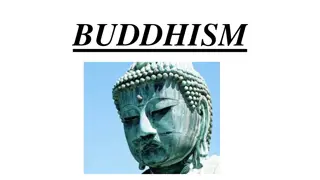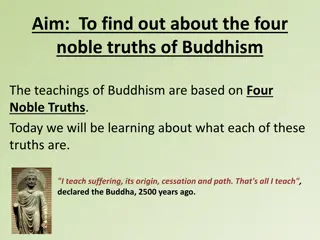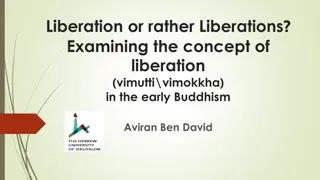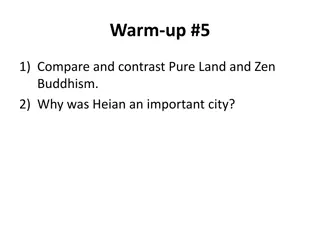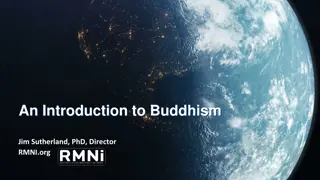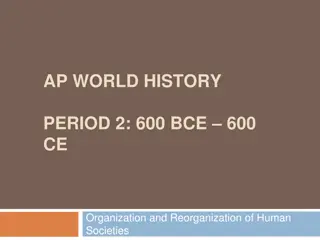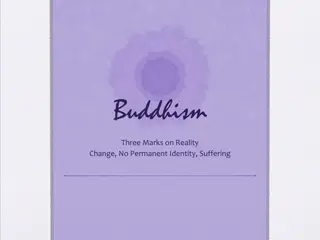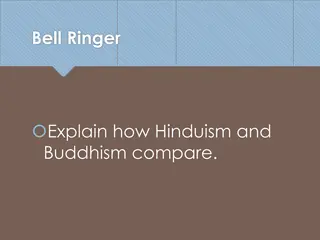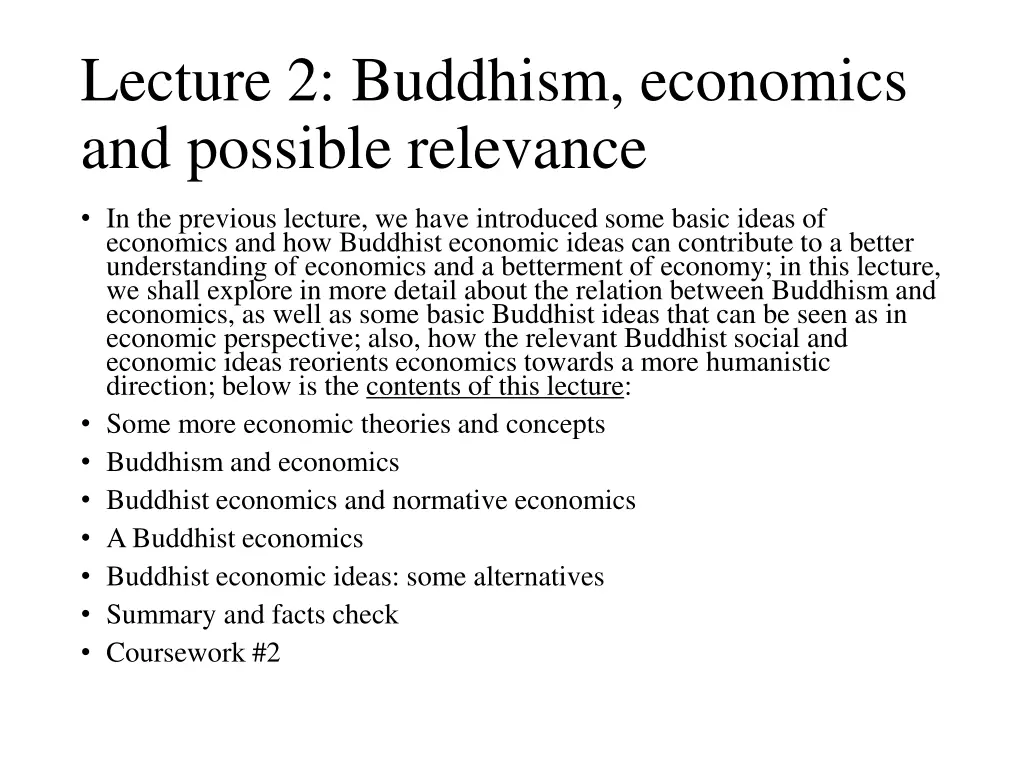
Exploring Buddhism's Influence on Economics and Economy
Delve into the intricate relationship between Buddhism and economics, uncovering how Buddhist principles can reshape economic perspectives and lead to a more humanistic approach. Explore planned and free market economies, market categories, and more in this enlightening discourse.
Download Presentation

Please find below an Image/Link to download the presentation.
The content on the website is provided AS IS for your information and personal use only. It may not be sold, licensed, or shared on other websites without obtaining consent from the author. If you encounter any issues during the download, it is possible that the publisher has removed the file from their server.
You are allowed to download the files provided on this website for personal or commercial use, subject to the condition that they are used lawfully. All files are the property of their respective owners.
The content on the website is provided AS IS for your information and personal use only. It may not be sold, licensed, or shared on other websites without obtaining consent from the author.
E N D
Presentation Transcript
Lecture 2: Buddhism, economics and possible relevance In the previous lecture, we have introduced some basic ideas of economics and how Buddhist economic ideas can contribute to a better understanding of economics and a betterment of economy; in this lecture, we shall explore in more detail about the relation between Buddhism and economics, as well as some basic Buddhist ideas that can be seen as in economic perspective; also, how the relevant Buddhist social and economic ideas reorients economics towards a more humanistic direction; below is the contents of this lecture: Some more economic theories and concepts Buddhism and economics Buddhist economics and normative economics A Buddhist economics Buddhist economic ideas: some alternatives Summary and facts check Coursework #2
Two traditional modes of economy Since economics is the study of economic performance or economy/economies, we mentioned that there are two ways of looking at the issues: the micro and the macro economics; regarding economy itself, there are also two traditional ways of managing it: the planed economy or the market economy; Planned economy: in this mode of economy, the government decides what to be produced (production) by whom (employment), and how much (quantities) and set up the prices of goods, among other economic policies; in planned economy, government plays a great and dominant role; Free market economy: as in this type of economy, market dictates the supplies of goods according to the market demands, and this then will also fluctuate the supplies and importantly, the prices; as a result, this mode of economy is famously known as laissez-faire (let it be) economy; it means that there should be as little government intervention as possible because the market will regulate itself; be cautious about the last point!
Market Market, as we mentioned, can be physical and non-physical, for it is the platform or just an instrument where voluntary economic exchange is conducted; some economists analyze market in three broad categories as follows: Product market: this is the market where goods (physical products) or services (IT goods , for instance, apps) are exchanged buying and selling; Labor market: here, goods (skills or knowledge) or services (such as hiring agencies) are exchanged demands and supplies; Capital market: this refers to investments of capitals and financial sectors where money or capitals are exchanged;
Laissez-faire (market) economy vs planned economy
Some explanations: Adam Smith and Karl Marx Adam Smith, author of The Theory of Moral Sentiments (1759) and The Wealth of Nations (1776), is generally regarded as the father of modern economics and because the ideas advanced in The Wealth of Nations, he is also regarded as the symbol of laissez-faire economics; In 1867, Karl Marx published his first volume of Das Kapital (Capital: A Critique of Political Economy), which is a critical analysis of the capital economic system; it laid down the foundation for socialist economic systems, which many ideas had been incorporated into planned economic systems; but it may be cautioned that while planned economy and some ideas can be traced to Karl Marx, it is not entirely fair to equalize Marx s economic ideas and planned economic systems, in particular in a dogmatic way;
Theory and reality: the difference In previously slide, we mentioned that the market economy means of free market where prices are set, and the issues of supplies and demands would be sorted out, this is then called market equilibrium; for example, without much intervention, the new generation of a smart phone would either replace the old one or reduce the price of the old generation phone; the supplies and demands would be accordingly adjusted; But in the 2008s, because of decades of deregulation (less regulations), market lost control and collapsed, plaguing many working people into deep poverty; but before that, despite the underlining risks, market economy indeed worked fine and eliminated poverty all over the world; so what is the problem?
Mixed economy Because the potential risks inherited in the market economy, a middle way approach is invented, so that modern economy is generally mixed economy; In a modern society, although it is comparatively clear that a market economy is good for the development of economy, especially in terms of economy growth (accompanied with and compounded by technological innovation and entrepreneurship which can only be possible with free market as incentives), it is at the same time risky for a market economy where necessary governmental inspections and guideline regulations are absent; as a result, in most countries of the world, governments have adopted a mixed economy whereby a market economy is constantly checked by governmental intervention and inspection;
Buddhism and economics We shall discuss in more detail regarding Buddhism and economics, Buddhist economic ideas and Buddhist economics in the forthcoming lectures; below are just some important teachings to start with: Dependent co-origination (relationship of interdependence, such as individuals and societies); Noble eightfold path and the importance of right livelihood, and the economic implications; Sigalovada-sutta and Agga a-sutta, amongst other suttas and texts; Meaning of life as the ultimate end maximizing happiness vs means of achieving that end minimizing material necessities;
Buddhist economics: below may not the exact words of the Buddha but the sentence in effect captures the gist of Buddhist economic ideal: maximizing happiness by minimizing the means material consumption;
Buddhism and normative economics As we mentioned earlier, while positive economics concerns about the theories and facts of economic studies, normative economics concerns about general policies and economic ethics such as poverty and its economic implication in the real society; We may think that as a study of economy, issues of ethics and social justice should be the works of sociologists or politicians, not economists or economics; but the first textbook of economics, Principles of Economics, by Alfred Marshall, started with these sentences: Political economy or economics is a study of mankind in the ordinary business of life; it examines that part of individual and social action which is most closely connected with the attainment and with the use of the material requisites of wellbeing. (Principles of Economics, p.1) Here, obviously, Buddhist ideas of social justice, sustainability, and fairness and equality are intersecting with normative economics;
A case in point As we understand so far, economics, in its theory or practice, is a proper understanding of scare of resources and its efficient distribution amongst individuals in the society; although such a noble ideal might be overlooked and many people and their welfare may have been suffered as a result; still, economic efficiency and fairness are the two sides of the same coin human wellbeing and a functional society; For example, in 2019, the Nobel Prize in Economics was awarded to three economists for their experimental approach to alleviating global poverty; this means that poverty is part of economics, and perhaps the fundamental part of it, even though many people may only look at the glamorous side of economists who not only materially awarded but also more often than not, famous due to their involvement in policy-making;
Economics: generally, scholars of Buddhist economics point out that general economics emphasizes too much on profits, efficiency and reduction of cost; hence sometimes the ultimate end people are forgotten; below are the characteristics of economics; Maximizing efficiency Maximizing profits Minimizing cost
Economics As we mentioned, market economic theories assume, to some extent, rightly, that market generally regulates itself, so the less intervention, the better; Because the comparative success of market economic system in the past (albeit with occasional corrections), it is the dominant economic system all over the world, with some degree of mixture of governmental inspection and institutional regulation; economics therefore is largely studies and promotion of market economic ideas; So in a contemporary sense, the key of economy and economics is to maximize profits and efficiency and minimizing cost, sometimes even at the expense of people, natural resources and environment etc.;
Buddhist economics: by studying Buddhist economic ideas, scholars suggest that in Buddhist economics, the ultimate end is people and happiness, so the means, such as unlimited wants and unheeded wastage, overconsumption, and exceeding use of resources, should be minimized; below are some Buddhist ideals of economics and economy; Maximizing happiness Minimizing desires Minimizing overconsumption
Buddhist economic ideas: some alternatives Because the pressing issues such as climate change, global warming, environment pollution and resource exhaustion, that largely caused by the modern development under the guise of economic growth, scholars started to find alternative ideas of economic development; this then makes Buddhism and Buddhist ideas extremely relevant to and necessary for the better understanding of economics; Instead of maximizing profits and efficiency by means of material consumption, Buddhism starts with a reminder: the purpose of life is not material possessions, but happiness; and true and lasting happiness is not material consumption but spiritual advancement;
Buddhism and sustainability Because the Buddha viewed the world as merely phenomenal and therefore it is impermanent, only spirituality is the ultimate pursuit that would yield everlasting happiness; But since we are here in this world, daily necessities are essential to maintain our life; therefore the Buddha outlined a practical way of life: the middle way approach: material wellbeing is not the end, but merely a means to the spiritual end eternal happiness is the ultimate end; material needs are therefore necessary but they must be kept to the level of necessity, but not luxury; Here, again it might be relevant to mention that in 2018, one of the Nobel Prize laureates in Economics, Professor William Nordhaus was awarded the prize for integrating climate change into long-run macroeconomic analysis; we shall have more discussion regarding this issue later;
Summary: facts check-1 Two types of traditional economy: market and planned/commanded economies; Modern reform: mixed economy of free market and central plans and government interventions; Adam Smith/market economy vs Karl Marx/planned economy: it is a way of comparison but should do so cautiously; Buddhism and economics should be kept in mind because it is a new field of study and it is not as well established as Buddhist ethics or Buddhist philosophy; Related to the above point, scholars have tried and comparatively successful in drawing the attention of economists or scholars of comparative economics to the importance of Buddhist approach to economics Buddhist economics an alternative;
Facts check-2 In terms of Buddhist economics, its similarities with normative economics are more than apparent: both concerned with issues such as poverty, social justice, economic equality, and environment protection, amongst other relevant issues; While general economics concerns more about maximizing profits and efficiency and minimizing cost, Buddhist economics emphasizes chiefly on the wellbeing of people, protection of nature (animals and plants etc.;) and sustainability etc. maximizing happiness, minimizing desires and material consumption; That should all for this week; enjoy your reading if you can! Any questions, please feel free to send me emails.
Coursework #2 Do the following exercises and submit them via email (chuanqing@bcs.edu.sg) to me by 5:00 pm, on 16th September (Wednesday); as usual, please send the exercises of the two courses (Buddhism and Economics & Introduction to Buddhist Logic) together in one Word doc. file; 1, What is the characteristics of free market economy? 2, In Buddhist economics, we are told to maximize happiness and at the same time to minimize our desires and material consumption; do you think this is possible?

